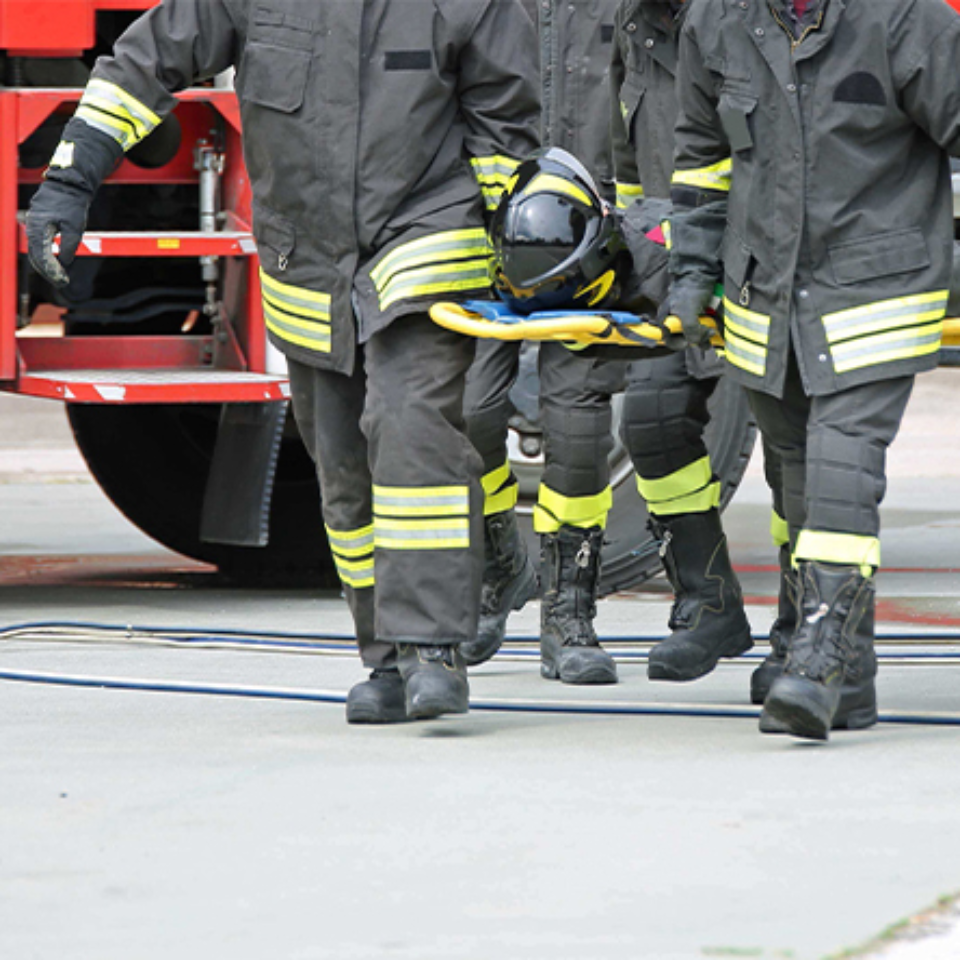Fire & Police Disability Benefit Claims
Black & Jones Attorneys at Law proudly support those who serve as emergency responders in the Greater Rockford and Northern Illinois areas. These heroes sacrifice themselves every day to help others and we are honored to be able to help them when they suffer from a disabling medical condition.
First responders are exposed to dangers that most employees in Illinois never have to face. Whether they are injured in a specific traumatic accident or suffer from a medical condition resulting from their daily job duties, they are entitled to benefits.

Illinois Workers’ Compensation Act = Your Advantage
If first responders—such as police officers, firefighters or paramedics—are injured while working, they are likely entitled to compensation under the Illinois Workers’ Compensation Act. This includes benefits such as payment of medical treatment bills, temporary total disability benefits if they are off work per a doctor or on a restriction the employer cannot accommodate, and additional compensation for the injury after they reach maximum medical improvement. If you have been injured at work, learn more about the compensation you deserve from a reputable workers’ compensation attorney.

PEDA = The Law Is on Your Side
Illinois law protects first responders by providing wage benefits when they are off work due to medical conditions resulting from work-related injuries. Police officers and firefighters of municipalities that are injured on the job are entitled to duty disability benefits that exceed what would be paid under the Illinois Workers’ Compensation Act.
More about PEDA
Who Qualifies for PEDA Benefits?
All full-time law enforcement officers or full-time firefighters or paramedics who are employed by the State of Illinois, any unit of local government, or any state supported college or university. See the full list of who qualifies here.
Applying
Police officers, paramedics, firefighters or eligible employees who are taken off work due to a work injury should report the injury and status to their supervisor immediately. Contact your employer’s human resource department to notify them of your condition and ask that PEDA benefits be issued.
Notifying Your Supervisor
PEDA and workers’ compensation benefits are separate and distinct. While you should notify your supervisor of your injury and inability to work, to file a workers’ compensation claim before the Illinois Workers’ Compensation Commission, you must file an application for adjustment of claims. Discover more about filing a workers’ compensation case.
Length of Benefits
PEDA benefits are payable for up to a maximum of one year or 365 days.
This excludes the dates you return to light or full duty.
Thinking of Working Elsewhere?
While on PEDA benefits, you may not be employed in any other manner with or without monetary compensation.
PEDA for Part-Time Employees
Part-time employees receive compensation calculated based on the percentage of time they were scheduled to work pursuant to their status as part-time employees.

Line of Duty Disability Pensions: 65% of Salary Outside of Chicago
If a first responder becomes sick, gets into an accident or receives an injury due to an act of duty and is found to be disabled, they shall be entitled to a disability retirement pension equal to the greatest of:
1. 65% of the salary attached to their rank at the date of suspension or retirement or
2. The retirement pension that the employee would be eligible to receive if they retired
This benefit would cover disabilities resulting from catastrophic work-related injuries.

Disability Pension for Disabilities Incurred Not on Duty: 50% of Salary
If a first responder, who has been employed at least 7 creditable years, becomes disabled from any cause other than during the performance of an act of duty, the employee is entitled to a disability pension of 50% of the salary attached to the employee’s rank at the time of suspension or retirement. This benefit would cover disabilities resulting from personal or non-work-related conditions.

Public Safety Employee Benefits Act (PSEBA)
The Public Safety Employee Benefits Act is an Illinois law that mandates employer-funded health insurance for first responders who are injured or killed in the line of duty. If you are awarded a line of duty disability pension, this law may entitle you and your family to health insurance.
KEY STEPS
Initial Consultation
The insurance companies aren’t thinking about your best interests. So, get in touch with us first. We’ll explain your options and ensure you’re taking all the right steps.
Notifying Your Employer
Most law professionals recommend you notify your employer immediately after you get injured—or whenever you realize a link between your condition and your work. This can be as simple as mentioning you have pain or need to see a doctor.
Filing Your Claim
Qualified police officers and firefighters must go through a formal application process with their pension board. From there, the board will conduct a hearing to determine your eligibility. Benefits may be payable under the Public Employee Disability Act (PEDA), Illinois Workers’ Compensation Act, the Illinois Disability Pension Code and Public Safety Employee Benefits Act. The law can be confusing and the process complicated. Reach out to a knowledgeable firm dedicated to helping first responders like Black & Jones Attorneys at Law.
Start Your Free Consultation
Related Blog Posts

Black & Jones Proves Police Officer’s Lumbar Surgery is Related to His Work Injury
A client asked Black & Jones to represent him when his employer’s insurance company denied that his need for back surgery was related to a slip-and-fall at work. His doctor had ordered surgery, but would not schedule it due to lack of approval from insurance. He was unable to work due to his back and was not receiving any pay. Bills were accumulating and he was not getting any answers from his employer.

Attention Firefighters: Expanded Benefits in Illinois
If you or someone you know is a firefighter, EMT or paramedic and was diagnosed with MRSA or any other bloodborne pathogen, lung or respiratory disease or condition, heart or vascular disease or condition, hypertension, tuberculosis, or cancer resulting in disability, you may be entitled to benefits under the Illinois Workers’ Compensation Act.

I have heard of the “Heart and Lung Act,” but what is it?
I have had several firefighters, EMTs and paramedics ask me if they can get compensation for their heart or lung disease under “the new Heart and Lung Act.”